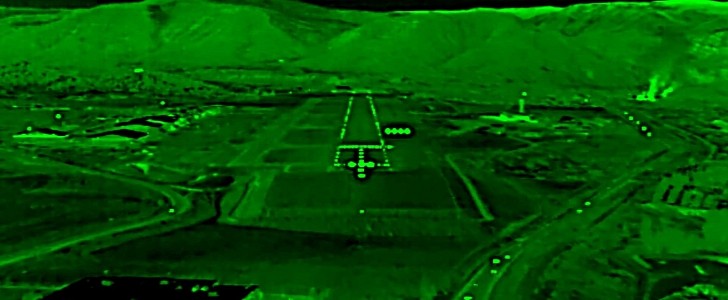Highly-advanced sensors that drastically improve pilot visibility are not just limited to military use. Commercial airplanes are also starting to integrate the latest tech when it comes to visibility, making commercial flight not only safer, but (indirectly) more fuel-efficient.
Collins Aerospace recently showcased some of its latest military aviation technology, at the U.S. Navy League’s Global Maritime Exposition, including an air-combat training system and the MS-110 and MS-177 family of systems (FoS) that provides cutting-edge image resolution and an extended coverage area. Now, Collins announced that Airbus has selected its next-generation sensor, to be integrated into the Enhanced Flight Vision System (EFVS).
Located on the nose of the aircraft, this sensor will enable an augmented reality view of the outside environment. In poor visibility conditions, when the human eye can only detect so much, the sensor’s multiple infrared and visible light cameras allow the pilot to get an accurate view of what’s going on outside. Especially in the case of fog of rain, which are often responsible for flight disruptions, the pilot can get a better image of the runway, by viewing the camera video on head-up displays.
And there’s a secondary benefit. Since better visibility means fewer delays on the runway or in-flight, it’s also a way of reducing carbon emissions and cutting costs. By integrating the sensor into the Airbus EFVS, airlines all over the world will be able to benefit from this technology. For now, the sensor will be implemented on the A320 aircraft, with plans of adding other platforms as well, in the future.
The Airbus A320, an aircraft that’s available in four sizes (A318, A319, A320 and A321), was introduced as the “longest-range single-aisle aircraft. This meant new travel opportunities around the world, with these aircraft capable of flying almost anywhere, and taking off from urban runways to remote airports, located at high-altitudes.
The EFVS, which will now incorporate the Collins next-gen sensor, is designed to provide exceptional situational awareness.
Located on the nose of the aircraft, this sensor will enable an augmented reality view of the outside environment. In poor visibility conditions, when the human eye can only detect so much, the sensor’s multiple infrared and visible light cameras allow the pilot to get an accurate view of what’s going on outside. Especially in the case of fog of rain, which are often responsible for flight disruptions, the pilot can get a better image of the runway, by viewing the camera video on head-up displays.
And there’s a secondary benefit. Since better visibility means fewer delays on the runway or in-flight, it’s also a way of reducing carbon emissions and cutting costs. By integrating the sensor into the Airbus EFVS, airlines all over the world will be able to benefit from this technology. For now, the sensor will be implemented on the A320 aircraft, with plans of adding other platforms as well, in the future.
The Airbus A320, an aircraft that’s available in four sizes (A318, A319, A320 and A321), was introduced as the “longest-range single-aisle aircraft. This meant new travel opportunities around the world, with these aircraft capable of flying almost anywhere, and taking off from urban runways to remote airports, located at high-altitudes.
The EFVS, which will now incorporate the Collins next-gen sensor, is designed to provide exceptional situational awareness.








